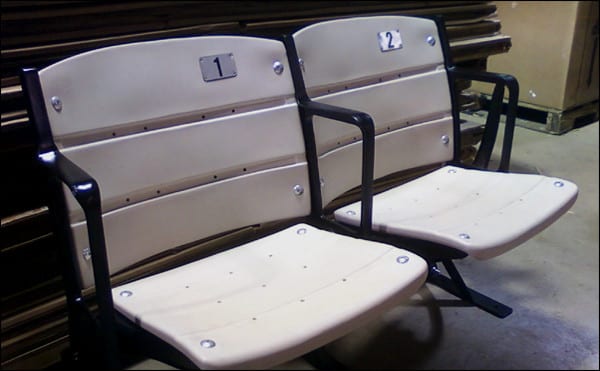
2014 world cup tickets are extremely high demand with the event just weeks away. Of note is the special seating considerations being made for a fans with a certain type of physical challenge - but this particular seating consideration is not part of Americans with Disabilities Act (ADA) at least not yet.
2014 world cup tickets are is extremely high demand as the event draws near. Of note is the special seating considerations being made for a fans with physical challenges - but not the challenges you're thinking of.
Soccer fans of a larger stature will have special seating available to them as pat of their ticket purchase. The extra wide seats are of limited availability and cost twice as much as a "normal" seat.
From the FIFA World Cup website:
Accessibility is an important item for inclusion, also a requirement by the Brazilian government and FIFA. The Castelão in Fortaleza is an example of how football may bring about this type of legacy in the country. From the total of 63,903 seats, 1,675 are reserved for obese people, or people with disabilities. This number corresponds to 2.4% of the stadium's capacity, which is more than the minimum requirement of 1% anticipated by the World Cup General Bill and administrative rule
The World Cup special seating considerations for larger patrons are being made as part of general accessibly for the disabled and therein lies the controversy.
Early reports of the 2014 World Cup ticketing purchase process includes buyers being denied the extra wide seats because they cannot provide adequate prove they have the need, regardless if they have the means to pay the higher price.
To qualify for one of the special seats, fans will have to submit a medical certificate recognized by the Brazilian Ministry of Health and World Health Organization that proves they have a body mass index of 30 or more.
In the United States, being overweight is not legally considered to be a medical handicap in and of itself. An individual may be assigned handicapped privileges after an examination by a doctor, but one may not simply declare themselves "handicapped" on their own.
The new focus on obesity began when New York city mayor Micheal Bloomberg banned the sale of sugary soft drinks larger than 16 oz. The controversial measure, made under the auspices of the city's Department of Health, is similar to other government mandates (fire safety, Americans with Disabilities Act, etc.) that venues must contend with. The NYC ban on large sugary drinks is part of the larger issue of special considerations for obesity.
Airline fell into the fray a few years ago when they announced that passengers of a certain weight would have to purchase two seats in order to fly. Unlike the 2013 World Cup and the NYC measure, the airline do not make special seating considerations for health or well being - they make them solely on the grounds of cost.
Therein may lie the issue for venue owners. Seating for larger persons should be made, when practical, but at what point does it transcend being a courtesy and become compliance with the law? A previous ThunderTix post looked ADA compliance.
The Americans with Disabilities Act (ADA) passed new regulations to include provisions regarding the sale of accessible tickets, including providing people with disabilities with the opportunity to purchase tickets using the same methods available to patrons without disabilities.
The ThunderTix support staff can now specify seats within a seating chart as wheelchair seats. The seats will include the caption “Wheelchair” in front of the seat label along with a Wheelchair icon upon hovering over the seat during the selection process.
Plus sized, but otherwise able-bodied, persons are not technically part of ADA, at least not yet. ADA defines eligibility for special seating considerations as those in wheelchairs and of "reduced mobility" but it does not clearly define a person's weight as being a medical condition.
Should assigned seating venues, ones that already comply with ADA for wheelchair access, find they are required by (future) law to make for special seating considerations for plus sized patrons they will not be able to charge more money for them.
If the 2014 World Cup sets a precedence, one that eventually becomes pervasive in the United States, venues may need to adapt and expand their current ADA compliance policies to include overweight persons.
ADA compliance is made much easier when you use ThunderTix as your online ticketing software. Our technology can provide you with advanced reserved seating charts for special seating considerations, be it formal ADA compliance or your preemptive policy for double wide seats.